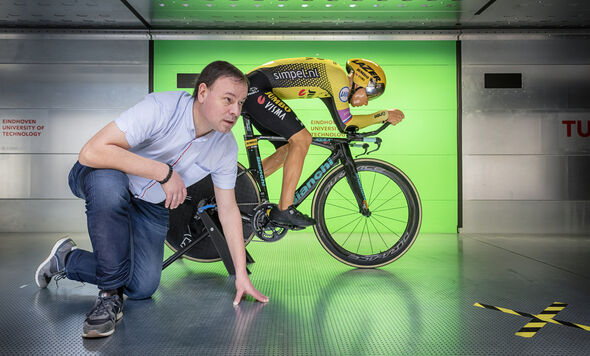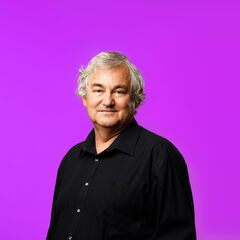
Increase in MOOC users due to corona
TU/e sees opportunities
A phenomenon that originated in the late noughties and is aimed at online participation in education by large masses of people: MOOC, Massive Open Online Course. Various TU/e professors offer MOOCs. Professors Bert Blocken and Jan Smits are now, during corona, taking advantage of the time they previously invested in making their MOOCs: “Where others had to record all their lectures, I could refer to my MOOC”, Blocken says.
Blocken, professor at the department of Built Environment, started early: his MOOC was already on Coursera in 2013. “Rector Hans van Duijn asked me to start with this. I wanted to give it a try, but it turned out to be a lot more work than I expected. After a lot of blood, sweat and tears, it was finished eight months after I was asked the question. My MOOC, ‘Sports and Building Aerodynamics’ is based on the course ‘Urban Physics’ that I already taught, but a sports component has been added to make it interesting for more people. I already had about 60 percent of the material and the rest is new. I also invested a lot of time in the quality of the slides. The MOOC is now also taught as a new subject and followed by about thirty to fifty students, mainly from Mechanical Engineering, Built Environment and Applied Physics, often with an interest in sports.”
Positive reviews
Blocken’s MOOC is successful, although it is difficult to see the total figures because the platform has been changed in the meantime and the counter was reset to zero. But 28,000 pupils already took part in the first few starting moments, with an average rating of 4.8 out of 5. Ten to 15 percent passes the course. That may not sound like a lot, but it makes sense: the exam is tough and you really have to study to pass it. Students appreciate the MOOCs: “I regularly see messages on LinkedIn where people share their certificates and say thank you to the university. That's always nice, of course,” Blocken says.
Jan Smits, professor emeritus of Law and Technology at the department of Industrial Engineering & Innovation Sciences, has five MOOCs on Coursera. The first came online in 2018 and 10,000 pupils - or learners, as Coursera calls them - have already been reached. Of those, 2,000 have completed one or more MOOCs with a certificate. Smits also gets good ratings: “an average of 4.5 on a scale of 5. If you have successfully completed all my MOOCs, then that is worth about 5 ects. You can request an exemption at the Examination Board. That has not happened yet, but the chance is increasing.”
Now with corona we realized that we don't have a decent education model that fits the studying-from-home situation that this health mess is enforcing
The Higher Education Press Agency also sees the increase in MOOC users. "Since the beginning of the first lockdown, the number has increased significantly," they state in an article about MOOCs. "Since then, 21 million new students have joined Coursera: 3.5 times more than in the same period last year." The explanations for this lie in the search for a new hobby, but also in retraining and as a help with online education, because many universities also offer courses on the platform.
Recording a lecture is not a MOOC
Blocken certainly sees a future for MOOCs, even though there’s much more (live) online education these days. “Of course it depends on the type of MOOC. There are ‘MOOCs’ online which are really just recordings of lessons/lectures. I wouldn't call those MOOCs. If you see how many people are involved in delivering a good MOOC at TU/e, you can see the differences. We have a studio and people who professionally edit the footage. That's really important. The range of MOOCs now also offers you extra options: you can refer students to a MOOC from another university. I can imagine that this also happened during corona times: teachers who referred to existing MOOCs because they did not have their own course or lectures online yet. The mindset has also changed: where there used to be quite a bit of skepticism about online education, we all do it now. And I don't think we'll stop doing it after corona. Anyhow, I will continue to use my MOOC: it took me a lot of time to create, but now it saves me a lot of time.”
Smits also sees a future for MOOCs. “But I don’t believe in distance learning only. TU Delft does more with MOOCs than our university (hundreds versus six MOOCs, ed.), While we have a lot of knowledge around here. A missed opportunity for the marketing and reputation building of our university.” The 3 millionth MOOC student has already registered at TU Delft, the university reports on its website. Smits: “Innovation doesn't really happen in education. We talk the talk but we don’t walk the walk - we set up all kinds of research institutes and started with challenge-based learning. But now with corona we realized that we don't have a decent education model that fits the studying-from-home situation that this health mess is enforcing.”
“We have to put people who made the TU/e MOOCs together,” Smits says. “Together we know a lot, of course. In my opinion, that knowledge is not even used, which is annoying. We must give a platform to the people who are engaged in innovating education. If we don't show those gems, they’ll never become the norm. I sincerely hope that we will also create the innovation developed for businesses, for our education. If we don't watch out, TU Eindhoven will become the innovation department of the business community in the Brainport region. Providing good education is very difficult, but it will take years before we can fully return to the normal situation, which would leave us with a lost generation. That’s simply not an option.”
If we don't watch out, TU Eindhoven will become the innovation department of the business community in the Brainport region
Smits: “If you just make short videos of the basic theory of your lectures, like ‘How do you apply for a patent?’, you will profit for a long time. You can then also pay more attention to current affairs and students need to come to campus less often. And no more proctoring; testing the basic theory can then be done very differently, for example with peer reviews. I have done that before and students received a point for both their own work and their assessment skills, a double win.” Whether a MOOC still needs regular updates depends on the nature of the MOOC. “This is not necessary for a course like Calculus, but you have to update things that are based on current affairs. In my MOOC, for example, more research has now been done into sprinting and cycling, so I want to add an update with some results,” Blocken says.
New talent
Blocken: “I know many colleagues who cannot be motivated to do this (making a MOOC, ed.). I also don't think we should make it mandatory, but we should facilitate it if people want to try it. It is important to TU/e for sure. The benefits may not be immediately visible, but it will help in the long term for the university's publicity and brand awareness. In any case, it helped my research group a lot: one of my best MOOC students eventually came to me for a PhD and several master's students came here as a result as well. We’re not talking huge numbers here, because it is a very specific MOOC, but talent has come from Italy, China, Japan and Australia, among others.”
“In addition, a MOOC is a nice scalable form of education,” Smits adds. “The TU/e has 12,926 students (census of October 1, 2020, ed.). With my MOOC I already serve 10,000 students on my own. And that doubling has happened very quickly, from 655 in January this year to 5,011 in July to 10,069 in October. You can never achieve such a rapid increase in traditional classroom education. MOOCs provide an opportunity to put the university on the map."
Revenue model
The person who develops the MOOC receives money for that development, not per participant or per graduate. Smits: “I don't earn anything extra if a lot of students follow my MOOC. But I got money for making it. And the time I needed to do so was paid quite well.” The participants in turn can almost always participate in the education for free, but if they want to obtain a certificate, they have to pay. That’s the revenue model for platforms such as Coursera. This can go fast if companies purchase a course for their staff, as was the case with Smits' MOOC by, among others, a bank in India. “A lot of companies, especially from Asia, have bought my MOOCs. Then I suddenly get 650 new students. Companies also see how a MOOC can contribute to the professionalization of their staff. In this way, it cuts both ways and MOOCs contribute to lifelong learning.”




Discussion